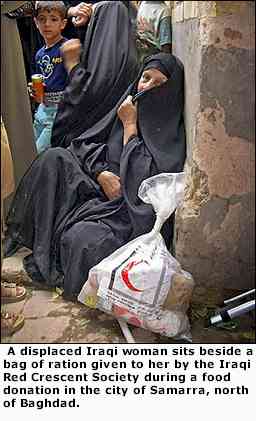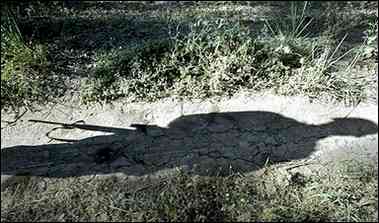"Roger Wright, UNICEF’s Special Representative for Iraq, lamented that children were confirmed as the major victims of food insecurity. “The chronic malnutrition rate of children in food insecure households was as high as 33 per cent, or one out of every three children malnourished,” he stated. Chronic malnutrition affects the youngest and most vulnerable children, aged 12 months to 23 months, most severely. “This can irreversibly hamper the young child’s optimal mental and cognitive development, not just their physical development,” he said. Acute malnutrition was also of concern, with nine per cent of Iraqi children being acutely malnourished. The highest rates (12-13 per cent) were again found in children aged under 24 months.
[Translation: Most of those children are likely to die very young because they haven't enough food to develop a properly functioning immune system. You do the arithmetic 12-13% means one child in eight. Take a group of 8 Iraqi children one of them will be acutely malnourished]
Continuing food insecurity in Iraq cannot be attributed to any one factor, but stems from several causes, including the lingering effects of war and sanctions, plus the ongoing conflict and insecurity. Their protracted and complicated interactions have resulted in increased unemployment, illiteracy, weakened infrastructure – power and water and sanitation in particular – and the direct loss of wage-earners for many families. Iraq’s food  insecurity is thus not simply due to lack of production of sufficient food nationally for the population, but more a failure to ensure access to sufficient food at the household level, the study suggests. insecurity is thus not simply due to lack of production of sufficient food nationally for the population, but more a failure to ensure access to sufficient food at the household level, the study suggests.
[Translation: Between sanctions, war, the war crime of deliberately bombing things like water purification plants, the current day to day killing of principal food earners, and the occupiers' ongoing campaign directed at breaking up Iraq a lot of people are in dire need. Unfortunately even distributing food relief is becoming a difficult and dangerous job.]
The PDS ration has represented by far the single most important food source in the diet and is still a major factor in stabilizing food security in Iraq, where 15 per cent of households are classified as Extremely Poor. Coping mechanisms that have had to be used by such households include consuming cheaper and poorer quality foodstuffs, reducing the number of daily meals and/or buying food on credit.
[Translation: Without the food handouts people will literally work for food of course there's not much work which is why I've previously published pohots of women and children combing the garbage dumps for food. It's also why in Baghdad you find kids prostituting themselves quite literally for a handful of potatoes.]
Educational levels have an impact on accessibility to food, with the more educated generally having greater ability to cope with difficult situations and a higher probability of employment. The study raises concerns about a growing drop-out rate among students under 15 years of age – 25 per cent of students under 15 who lived mostly in rural areas and were identified as extremely poor had dropped out of school, the main reasons for this being that households could no longer afford the expenses of schooling, that the schools were located too far away from home and that some children had to be sent to work to supplement household incomes."
[Translation: Do I really have to translate that? Of course another factor is that schools are closing all over the place because the teachers fear for their lives.]
Source: United Nations Children's Fund (UNICEF)
I've added the caption provided by AFP to the photo let's translate that:
- A displaced Iraqi .... = She's been driven out her home.
- a bag of ration ... = What's in the bag is what she has to feed herself and her children with. She has to make it last at least a day.
Also in the caption was this little gem:"President George W. Bush described militias as one of Iraq's main challenges"
- Words fail me. It's not just the militias George.
 ELEANOR HALL: So you're saying that it's not just the militias, it's not just the gangs that are creating problems for doctors, it is the authorities who are making life difficult? ELEANOR HALL: So you're saying that it's not just the militias, it's not just the gangs that are creating problems for doctors, it is the authorities who are making life difficult?
SALAM ISMAEL: Exactly. Exactly. The American coalition forces, they are making retirement of some of the head seniors of doctors. This is exactly after the invasion, and they are forcing them to retire and leave the country because accordingly they are from background of Ba'ath party. And, you know, the Ba'ath party people are joining it because of their need of money at that time.
Anyway, the other part of it is after that the accusing of doctors of treating insurgents is one of the major cruels that's played in affecting doctors in themselves. In many areas doctors have been arrested, detained, told, I mean torched by… and beating inside their own clinics, and that's happened several times in the west of Iraq.
ELEANOR HALL: You're saying that's by coalition forces?
SALAM ISMAEL: Yes, by coalition forces. And we have evidence.
Read the whole thing here
markfromireland |


